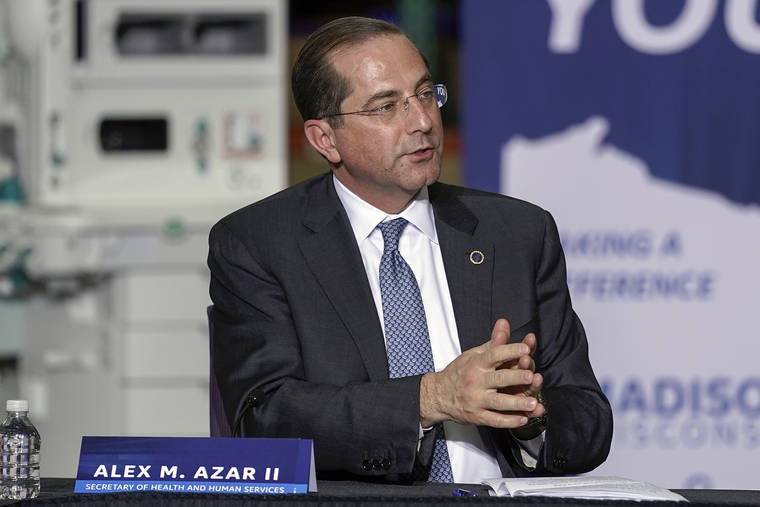WASHINGTON — The Trump administration announced a plan Wednesday to start paying hospitals and doctors who care for uninsured patients with COVID-19, but Democratic lawmakers and health industry groups are likely to press for more.
Under the approach detailed by Health and Human Services Secretary Alex Azar, hospitals and doctors would submit their bills directly to the government and they would get paid at Medicare rates.
Uninsured people would not be liable for costs, and health care providers would not have to ask any questions about a patient’s immigration status, an issue that’s been cited as a barrier to care in communities with many foreign-born residents.
“This says if you don’t have insurance, go get taken care of — we have you covered,” Azar said in an interview.
The money will come from a pot of $100 billion that Congress has approved to provide relief for the health care system, which is trying to cope with the high cost of coronavirus care while facing a cash crunch because elective surgeries and procedures have been put on hold. For COVID-19 patients who are covered by health insurance, hospitals and doctors accepting money from the relief fund would have to agree to not to send “surprise” bills for out-of-network services.
COVID-19 treatment for the uninsured could cost from $14 billion to $48 billion, according to a recent estimate from the nonpartisan Kaiser Family Foundation.
Azar said the administration is not providing an estimate on what its plan will cost, but he is confident it will fit within the $100 billion allocated by Congress. Lawmakers are finalizing another coronavirus relief bill, expected to add $75 billion more for the health care system.
Democrats and some health industry groups say the relief money approved by Congress should go directly to health care facilities, and the administration should cover the uninsured by expanding programs such as Medicaid and the Affordable Care Act. An HHS press release describing the plan for the uninsured says payments for their care would be made “subject to available funding.”
About 28 million people were uninsured before the pandemic hit, and that number is expected to rise sharply. Consultants at Health Management Associates estimate that 12 million to 35 million people could lose workplace coverage in the economic shutdown aimed at containing the spread of the coronavirus.
The plan for the uninsured was part of a broader announcement by the government detailing a second round of economic relief payments to hospitals, doctors and other health care service providers.
Before Wednesday’s announcement, $30 billion had been distributed. Additional funds now being released include:
— $20 billion in payments across a range of health care facilities.
— $10 billion targeted to coronavirus hot spots; New York will receive $4.4 billion.
—$10 billion for rural health clinics and hospitals
—$400 million for Indian Health Service facilities.
Azar said additional allocations will be announced for nursing homes, for hospitals and doctors that rely on Medicaid, and for dentists.



